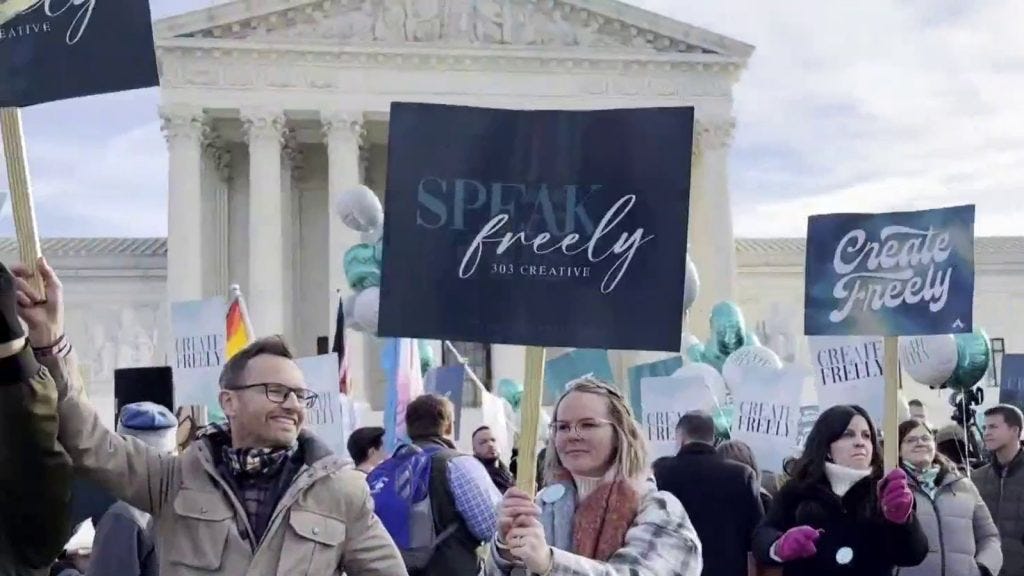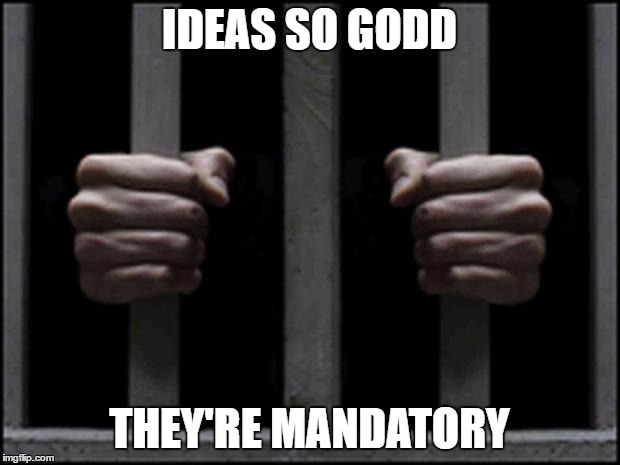Of Gay Wedding Cakes and Woke Restaurants
Of Gay Wedding Cakes and Woke Restaurants

by James Corbett
Remember the Supreme Court of the United States' momentous 2018 decision on Masterpiece Cakeshop, Ltd. v. Colorado Civil Rights Commission?
Probably not, huh? But what if I say "the gay wedding cake case"? Starting to ring a bell?
It probably will ring a bell for American libertarians in the crowd, as the issue of whether bakers should be forced to bake imaginatively decorated wedding cakes became an important wedge issue in the Libertarian Party's 2016 presidential forum. (Yes, seriously.)
And if you caught my 2018 interview with Patrick MacFarlane about the case, you might also remember that the US Supreme Court's ruling was far from decisive. In fact, it punted on the core issue: whether or not a Christian baker can be compelled to bake a cake against their deeply held religious belief. As we predicted in that conversation, the Masterpiece case may be over but this issue would rear its head in the courts again.
Well, guess what? It's 2022 and gay wedding cakes are so last decade, grandpa. Now it's all about gay website design and woke restaurants refusing service to Christian customers.
Are you ready to get to the heart of the matter? I thought so. Let's go!
THE BACKGROUND
For those who don't know the saga of the gay wedding cake, it began when Charlie Craig and David Mullins decided to get married in 2012. Given that gay marriage was still not recognized in their home state of Colorado at the time, they planned to get married in Massachusetts and then return to Colorado for their wedding reception.
Craig and Mullins visited Masterpiece Cakeshop in Lakewood, Colorado, in July 2012 to purchase a cake for their reception. That's when the owner, Jack Phillips, informed them that he would not bake a cake for a gay wedding due to his Christian beliefs about marriage, but assured them he would sell them anything else in the store. Craig and Mullins filed a complaint with the Colorado Civil Rights Commission, which ruled against Masterpiece, holding that the bakery would not only have to start baking gay wedding cakes, but that it would have to change its policies, provide "comprehensive staff training" regarding public accommodations discrimination and provide quarterly reports documenting their compliance with the order.
The commission's decision was upheld by the state appeals court and the case was eventually appealed all the way to the US Supreme Court. As you'll remember from Interview 1379 - Patrick MacFarlane on Liberty and the Law, the Supreme Court heard the case in 2018 and ruled for Masterpiece. Although Phillips "won" the case, the ruling was no great win for freedom of religion or free speech or against government encroachment on business or private property. Instead, the Supreme Court issued an extremely narrow decision on the basis that the Civil Rights Commission's consideration of the case "was neither tolerant nor respectful of [Phillips'] religious beliefs" and thus invalid.
In other words, the Supreme Court punted. What if the commission had been tolerant and respectful of Phillips' beliefs but still ordered him to bake the cake? Did they have that right? The Supreme Court decision does raise the specter of the "significant" First Amendment issues involved in forcing someone to use their skills "to make an expressive statement" that "implicates his deep and sincere religious beliefs," but it did not adjudicate those issues.
As MacFarlane and I discussed in our conversation about the ruling, the Supremes' avoidance of the core issue underlying the Masterpiece case left the door wide open for future court battles on the subject.
And now, in 2022, that's exactly what is happening.
THE LATEST
In recent weeks two more stories have appeared on the news radar, bringing the issue of when businesses can refuse service back into the public spotlight.
In the first story, The Family Foundation—a "non-profit, non-partisan, faith-based organization" in Virginia that "advocate[s] for policies based on Biblical principles that enable families to flourish at the state and local level"—had a private room booked at Metzger Bar and Butchery on November 30 for a gathering of friends and supporters of the foundation. The meeting was booked weeks in advance, but the restaurant canceled the booking just hours before the event was to take place because—according to a post on the foundation's blog—"an employee looked up our organization, and their wait staff refused to serve us."
The restaurant confirmed the story in an Instagram post, explaining: "Recently we refused service to a group of donors to a political organization that seeks to deprive women and LGBTQ+ persons of their basic human rights in Virginia. We have always refused service to anyone for making our staff uncomfortable or unsafe and this was the driving force behind our decision. Many of our staff are women and/or members of the LGBTQ+ community."
Rather than taking the issue to court, The Family Foundation has instead offered dialogue with the restaurant over the issue. "We would welcome an opportunity to have a discussion with them,” Todd Gathje, Director of Government Relations for the Family Foundation, told KTLA. “Meet with them in a private setting where [we] can have a heart-to-heart about some of the issues.”
In the second story, the US Supreme Court heard oral arguments last week in the case of Lorie Smith, a website designer from Colorado who, in 2016, decided to start offering wedding announcement websites to her clientele. She wanted to limit her wedding announcement design services to opposite-sex marriages so, in an effort to avoid becoming the next Jack Phillips, she pre-emptively sued Colorado's Civil Rights Commission to prevent them from applying the state's anti-discrimination laws to her proposed business.
The oral arguments quickly devolved into an exercise in speculation and even unhinged flights of fancy. Just as the Masterpiece cake case quickly became a case about convoluted hypotheticals—Must a Jew Bake a Nazi Cake? (inquiring minds want to know!)—the gay wedding website design case has become a case about everything except gay wedding website design. Can a website designer refuse to make interracial wedding websites? Can a shopping-mall photography business that produces photos of children in "classic" Santa Claus scenes insist that it only photograph white children? Can a Jewish person demand a Jewish photographer take a photograph for his ashleymadison.com profile?
Seriously. Check the links. I'm not making this psychedelic smorgasbord of deranged imaginary situations up. The Supreme Court "justices" presiding over the case are.
But perhaps these zany hypotheticals are actually gesturing towards the bigger question here. After all, this isn't really about cakes or websites or dinner parties at a restaurant, is it? This is about the fundamental question of when and how the government can step in and tell businesses who they must serve and under what conditions they must serve them.
THE BIGGER PICTURE
There is, of course, an easily comprehensible, principled, internally consistent solution to the supposedly thorny legal questions raised by these various cases: business owners can serve anyone they want and refuse service to anyone they want.
There, problem solved.
As we all know, however, no one except the fringiest of the fringe wingnuts who actually believe in voluntaryism would even contemplate this solution.
"People deciding for themselves what to do with their own property?" statists of all stripes exclaim in abject horror. "How absurd! You must be a racist sexist misogynistic homophobic bigot!" (Or, in the case of the Family Foundation supporters: "You must be an anti-Christian bigot!")
Sigh.
Anyway, I know that 99% of the population (and even the vast majority of my own audience) believes that governments and courts should step in to mandate who can and and cannot be refused service by any given business, but here's why they're wrong.
A normie might argue that if we were to take this dangerous "freedom" idea to its logical conclusion, then we would have to repeal all the wonderful anti-discrimination laws on the books going back all the way to (GASP!) the civil rights act. And you wouldn't be against the civil rights act, would you, you bigot? (*Rachel Maddow's fake astonishment intensifies*)
Well, firstly, if you live in a community where the only thing keeping shopkeepers from posting "No Blacks" signs on their front door is the civil rights act then I think the problem lies at a level deeper than the legislative realm, doesn't it? And if you wanted to solve that problem in a meaningful way, it would probably involve more than creating a new piece of legislation, wouldn't it?
Secondly, what does that magical piece of legislative paper actually do? Are we supposed to believe that politicians issuing another law willl magically transform bigots into loving people? Or that politicians issuing another law will make discrimination actually disappear? Of course it won't, which is exactly why the legislation's defenders fear that society will instantly re-segregate as soon as these laws are rescinded.
Thirdly, do defenders of this legislation realize thought through its actual effect: supporting the business of the very people they claim to be opposing? If people like Craig and Mullins are opposed to people like Jack Phillips and their Christian beliefs, then why don't they find a baker who wants to create gay wedding cakes and actively support that business? Why are they so desperate to give their money to Phillips in the first place?
Fourthly, why do normies believe that the government will only ever legislate in line with their beliefs? The same power that they are willing to grant the governments to force Christians to bake gay wedding cakes is the same power that the government could use to ban bakers from baking gay wedding cakes. After all, aren't these "bake the cake" authoritarians the very same people who have been warning us for the last five years that Orange Man Bad and his MAGA cult are going to institute concentration camps for transgenders and implement a Christian theocracy? So shouldn't they be arguing against giving government the power to institute these types of laws?
Rhetorical questions aside, I think we know what the real answer is here: power. A large swathe of the public salivates at the idea of using the mighty stick of government to beat their opponents into submission. And now just to vanquish those opponents, but to humiliate them by forcing them to act in ways that violate their own beliefs.
Imagine being like that. Imagine getting off on the idea of forcing someone you hate to serve you against their will.
But it's not just the normies who exhibit this lust for power or believe the lie that power of this sort is great as long as it's used in the "right" way by the "right" people. Even conspiracy realists fall prey to this line of thinking. After all, it might be argued that if business owners were allowed the horrible freedom to decide what to do with their own property then they might use that power to discriminate against "conspiracy theorists" or "antivaxxers" or anyone else they choose and—*poof*—those people will be starved out of existence.
But this, too, is a fallacy. The threat to our liberty comes not from individual business owners being able to decide who they do or don't serve. The threat comes from government having the ability to set those criteria in the first place. As long as people are allowed the freedom to decide who they transact with and in what way, then those of us who value our freedom will be able to support each other as we work toward building our intentional communities.
No, the algorithmic ghetto will not come about because individual business owners are choosing who to serve, but because we have ceded the power to make that choice to judges and politicians. And, as every conspiracy realist knows, those judges and politicians will inevitably be Young Global Leaders acting in service of the Great Reset agenda. The same power that you grant the government to ban QR codes and vaccine passports is the very same power that corrupt legislators will use to implement those QR codes and vaccine passports somewhere down the line.
As I said, the principal is as simple as it is powerful: let people serve who they want.
This is not rocket science. If we adhere to this simple principal then we take away the ring of power from our erstwhile opponents. Never again will a Christian baker have to bake a gay wedding cake or a Jewish baker have to bake a Nazi cake or a flying purple monkey from the planet Zepton have to eat radishes on Tuesday in contravention of the devout religious beliefs of the Zeptonians.
But most people can't bear the thought of casting the ring of power into the fires of Mount Doom. After all, I could use that power to defeat my political opponents!
. . . And so we go round and round in this carnival ride of laws and court rulings, constantly at each other's throats over the "proper" way to force other people to do what they don't want to do.
And once again we arrive at the conclusion that freedom is the answer, whatever the question. The problem is convincing the general public of that (let alone the Supreme Court justices).



Comments
Post a Comment